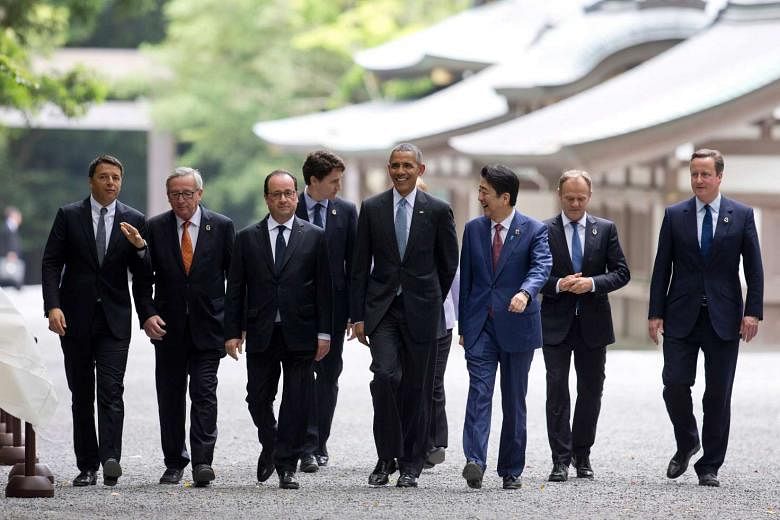A summit involving leaders of Group of Seven (G-7) advanced economies opened on Thursday (May 26) with focus on how to spur the sputtering global economy amid volatile oil prices, a steel glut due to an oversupply from China, and a slowdown in emerging economies.
Although the two-day summit is unlikely to end with a full agreement on macro-economic policy, the G-7 leaders are expected to promote monetary, fiscal and structural policies in their communique.
The summit comes as the G-7 nations disagree on how to boost the global economy. Host country Japan wants to boost public spending to drive world economic growth and has pushed for bold spending measures at the G-7 finance ministers' meeting earlier this month. Countries like France and Italy, however, support the use of fiscal stimulus, creating a rift with Britain and Germany.
Also expected on the agenda are issues including the June 23 referendum on whether Britain should stay or leave the European Union (EU), territorial disputes in the South China Sea, terrorism, cyber security and Europe's migrant crisis.
Japanese Prime Minister Shinzo Abe welcomed the leaders of Britain, Canada, France, Germany, Italy and the United States on Thursday morning at Ise Grand Shrine in Ise-Shima, about 300km south-west of Tokyo. The leaders took part in a Japanese cedar tree-planting ritual and strolled through the expansive grounds.
The shrine is the most sacred site of the Shinto religion but is not without controversy. Mr Abe, who practises Shinto, has said the location was chosen to introduce world leaders to Japanese culture and tradition, but critics have argued that it suggests an intent to hark back to religious politics in spite of a secular post-war Constitution.
Among the G-7 leaders was US President Barack Obama, with whom Mr Abe had an hour-long bilateral meeting late Wednesday night.
Their talks were dominated by the recent rape and murder of a 20-year-old Japanese woman in Okinawa, allegedly by a US marine veteran stationed on the island.
At a press conference after the meeting, both leaders pledged to ensure that justice will be served. Mr Abe said he felt "profound resentment against this self-centred and absolutely despicable crime", while Mr Obama extended his "deepest regrets". He added that the existing US-Japan Status of Forces Agreement does not preclude "the full prosecution and the need for justice under the Japanese legal system".
On US foreign policy, Mr Obama said since he took office, the US has engaged in a form of diplomacy that has led to "former adversaries working in partnership to provide economic opportunities to both of our peoples, to expand trade and commerce".
Mr Obama, who arrived in Japan from Vietnam on Wednesday, said Washington's growing partnership with the South-east Asian country is independent of the rise of China, and has been 30 years in the making.
"The fact that China would perceive that as some sort of provocation to them I think says more about Chinese attitudes than it says anything about our attitudes," he said.
The US leader added that existing tensions in the South China Sea over conflicting maritime claims involving China and South-east Asian nations such as Vietnam and the Philippines were "not of our making".
"We would very much like to see a peaceful resolution of those disputes. What's preventing that from happening is not anything we're doing," he said. "We're not taking a position on those claims. So it's entirely within China's power to resolve those disputes."
China is not part of the G-7 group and its state-run Xinhua news agency has issued numerous commentaries in recent days debunking the group's credibility and asking it to "mind its own business".
One report pointedly noted that the G-7 countries are facing "serious internal problems", and that instead of dealing with these issues, "some G-7 members are still making irresponsible remarks and trying to add irrelevant issues to the group's agenda."
European Council President Donald Tusk said on Thursday on the sidelines of the summit that the G-7 needs to take a "clear and tough stance" on China's controversial maritime claims.
"The policy of the G-7 is clear - any maritime or territorial claim should be based on international law and any territorial dispute should be resolved by peaceful means," Mr Tusk said. "Unilateral action and the use of force or coercion will not be accepted."
On Friday, Mr Obama and Mr Abe will visit Hiroshima, where about 140,000 people died after US forces dropped an atomic bomb on Aug 6, 1945.
Both leaders are expected to issue a call on denuclearisation. But Mr Abe said on Wednesday he has "no specific plans" to reciprocate with a visit to Pearl Harbour, where Japanese troops launched a surprise attack 75 years ago, drawing the US into World War II.
He reiterated his official visit to the US last year, where he visited the World War II Memorial and "laid a wreath to pray for the souls of all the war dead.
Mr Abe also held talks with British Prime Minister David Cameron on Wednesday night. They discussed the state of the global economy and measures to tackle corruption. They also supported the early ratification of an economic partnership agreement between the European Union (EU) and Japan.

